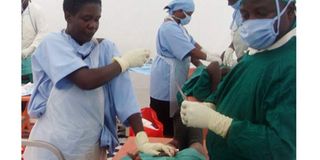Ministry okays non-surgical circumcision

Health workers perform surgical circumcision in Jinja recently.
What you need to know:
How it works. The device is placed on the male genitals and it cuts off blood supply to the foreskin, making it fall off within a week.
Kampala
The Ministry of Health has endorsed the PrePex method of circumcision which does not involve surgical procedure. Dr Alex Ario, the officer in-charge of care and treatment at the Aids Control Programme, said the Health ministry is finalising policy documents which will allow the gadget to be rolled out and used at health centres. “We are now finalising the policy documents on PrePex and when we are done, we shall train health workers on how to use the gadgets and ensure they are available in health facilities,” Dr Ario said.
The director for Surgery, Education and Research at International Hospital Kampala (IHK), who is also the project director for the Prepex trials in Uganda, Dr Moses Galukande, said the new circumcision method allows people to carry on with their work and has minimal pain.
Trials for PrePex were completed in December last year at IHK and another trial was conducted in Rakai District. Other trials have also been done in Kenya, Rwanda and Zimbabwe.
Dr Galukande said the device is placed in such a way that it cuts off blood supply to the foreskin which eventually becomes dry and falls off within a week. He added that the process takes about two to five minutes. “You do not need to take leave off work for the PrePex procedure to be done. We just place the device on the genitals and you will come back after one week for it to be removed. Some people might feel some little pain when the device is being removed,” Dr Galukande said.
Currently, the gadget costs $20 (Shs52,000) and the cost of procedure would perhaps depend on where the procedure is being done. According to WHO, male circumcision reduces the risk of heterosexually acquired HIV infection in men by approximately 60 per cent.
Uganda’s target is to circumcise five million males by 2015 but as of last year, less than half that number had been reached. This coupled with inadequate number of doctors and health workers able to perform the surgical method makes the PrePex a timely gadget for the country’s anti-HIV/Aids fight.



